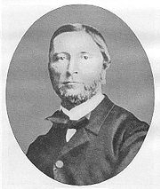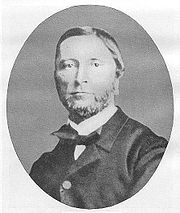
Wilhelm Paul Corssen
Encyclopedia
Wilhelm Paul Corssen was a German
philologist noted for his work on Latin
and Etruscan
topics.
 Corssen was born in Bremen
Corssen was born in Bremen
and, after his merchant father moved to Schwedt
in the Kingdom of Prussia
, received his school education there. After spending some time at the Joachimsthal-Gymnasium
in Berlin
, where his interest in philological pursuits was awakened by the rector, Meinike, he proceeded to the university, and there came especially under the influence of Philipp August Böckh
and Karl Lachmann
.
His first important appearance in literature was as the author of Origines poesis romanae, by which he had obtained the prize offered by the philosophical or arts faculty of the university. In 1846 he was called from Stettin, where he had for nearly two years held a post in the gymnasium, to occupy the position of lecturer in the royal academy at Pforta
(commonly called Schulpforta), and there he continued to labour for the next twenty years.
In 1854 he won a prize offered by the Royal Prussian Academy of Sciences for the best work on the pronunciation and accent of Latin
, a treatise which at once took rank, on its publication under the title of Über Aussprache, Vocalismus, und Betonung der lateinischen Sprache (1858–1859), as one of the most erudite and masterly works in its department. This was followed in 1863 by his Kritische Beiträge zur lat. Formenlehre, which were supplemented in 1866 by Kritische Nachtrage zur lat. Formenlehre.
In the discussion of the pronunciation of Latin he was naturally led to consider the various old Italian
dialects, and the results of his investigations appeared in miscellaneous communications to Franz Felix Adalbert Kuhn
's Zeitschrift fur vergleichende Schriftforschung. Ill-health obliged him to give up his professorship at Pforta and return to Berlin in 1866, but it produced almost no diminution of his literary activity. In 1867 he published an elaborate archaeological study entitled the Alterthumer und Kunstdenkmale des Gistercienserklosters St Marien und der Landesschule Pforta, in which he gathered together all that can be discovered about the history of the Pforta academy, the so-called "German Eton
", and in 1868-1869 he brought out a new edition of his work on Latin pronunciation.
From a very early period he had been attracted to the special study of Etruscan
remains, and had at various times given occasional expression to his opinions on individual points; but it was not till 1870 that he had the opportunity of visiting Italy
and completing his equipment for a formal treatment of the whole subject by personal inspection of the monuments. In 1874 appeared the first volume of Uber die Sprache der Etrusker, in which with great ingenuity and erudition he endeavoured to prove that the Etruscan language
was cognate with that of the Romans
. Before the second volume (published posthumously under the editorship of Kuhn) had received the last touches of his hand, he was cut off in 1875 by a comparatively early death.
----
("What I Owe to the Ancients") Friedrich Nietzsche
, who was educated at the Schulpforta, pays homage to Corssen in discussion of his education and writing style:
Germany
Germany , officially the Federal Republic of Germany , is a federal parliamentary republic in Europe. The country consists of 16 states while the capital and largest city is Berlin. Germany covers an area of 357,021 km2 and has a largely temperate seasonal climate...
philologist noted for his work on Latin
Latin
Latin is an Italic language originally spoken in Latium and Ancient Rome. It, along with most European languages, is a descendant of the ancient Proto-Indo-European language. Although it is considered a dead language, a number of scholars and members of the Christian clergy speak it fluently, and...
and Etruscan
Etruscan language
The Etruscan language was spoken and written by the Etruscan civilization, in what is present-day Italy, in the ancient region of Etruria and in parts of Lombardy, Veneto, and Emilia-Romagna...
topics.
Biography

Bremen
The City Municipality of Bremen is a Hanseatic city in northwestern Germany. A commercial and industrial city with a major port on the river Weser, Bremen is part of the Bremen-Oldenburg metropolitan area . Bremen is the second most populous city in North Germany and tenth in Germany.Bremen is...
and, after his merchant father moved to Schwedt
Schwedt
Schwedt is a city in Brandenburg, Germany. It is the largest city of the district Uckermark near the Oder river on the border with Poland.-Overview:...
in the Kingdom of Prussia
Kingdom of Prussia
The Kingdom of Prussia was a German kingdom from 1701 to 1918. Until the defeat of Germany in World War I, it comprised almost two-thirds of the area of the German Empire...
, received his school education there. After spending some time at the Joachimsthal-Gymnasium
Gymnasium (school)
A gymnasium is a type of school providing secondary education in some parts of Europe, comparable to English grammar schools or sixth form colleges and U.S. college preparatory high schools. The word γυμνάσιον was used in Ancient Greece, meaning a locality for both physical and intellectual...
in Berlin
Berlin
Berlin is the capital city of Germany and is one of the 16 states of Germany. With a population of 3.45 million people, Berlin is Germany's largest city. It is the second most populous city proper and the seventh most populous urban area in the European Union...
, where his interest in philological pursuits was awakened by the rector, Meinike, he proceeded to the university, and there came especially under the influence of Philipp August Böckh
Philipp August Böckh
August Böckh was a German classical scholar and antiquarian.-Biography:He was born in Karlsruhe, and educated at the local gymnasium; in 1803 he left for the University of Halle, where he studied theology. F.A...
and Karl Lachmann
Karl Lachmann
Karl Konrad Friedrich Wilhelm Lachmann was a German philologist and critic.-Biography:He was born in Brunswick, in what is now Lower Saxony....
.
His first important appearance in literature was as the author of Origines poesis romanae, by which he had obtained the prize offered by the philosophical or arts faculty of the university. In 1846 he was called from Stettin, where he had for nearly two years held a post in the gymnasium, to occupy the position of lecturer in the royal academy at Pforta
Pforta
Pforta, or Schulpforta, is a former Cistercian monastery, Pforta Abbey , near Naumburg on the Saale River in the German state of Saxony-Anhalt. It is now a celebrated German public boarding school, called Landesschule Pforta...
(commonly called Schulpforta), and there he continued to labour for the next twenty years.
In 1854 he won a prize offered by the Royal Prussian Academy of Sciences for the best work on the pronunciation and accent of Latin
Latin
Latin is an Italic language originally spoken in Latium and Ancient Rome. It, along with most European languages, is a descendant of the ancient Proto-Indo-European language. Although it is considered a dead language, a number of scholars and members of the Christian clergy speak it fluently, and...
, a treatise which at once took rank, on its publication under the title of Über Aussprache, Vocalismus, und Betonung der lateinischen Sprache (1858–1859), as one of the most erudite and masterly works in its department. This was followed in 1863 by his Kritische Beiträge zur lat. Formenlehre, which were supplemented in 1866 by Kritische Nachtrage zur lat. Formenlehre.
In the discussion of the pronunciation of Latin he was naturally led to consider the various old Italian
Italian language
Italian is a Romance language spoken mainly in Europe: Italy, Switzerland, San Marino, Vatican City, by minorities in Malta, Monaco, Croatia, Slovenia, France, Libya, Eritrea, and Somalia, and by immigrant communities in the Americas and Australia...
dialects, and the results of his investigations appeared in miscellaneous communications to Franz Felix Adalbert Kuhn
Franz Felix Adalbert Kuhn
Franz Felix Adalbert Kuhn was a German philologist and folklorist.Kuhn was born in Königsberg in Brandenburg's Neumark region. From 1841 he was connected with the Köllnisches Gymnasium at Berlin, of which he was appointed director in 1870. Kuhn was the founder of a new school of comparative...
's Zeitschrift fur vergleichende Schriftforschung. Ill-health obliged him to give up his professorship at Pforta and return to Berlin in 1866, but it produced almost no diminution of his literary activity. In 1867 he published an elaborate archaeological study entitled the Alterthumer und Kunstdenkmale des Gistercienserklosters St Marien und der Landesschule Pforta, in which he gathered together all that can be discovered about the history of the Pforta academy, the so-called "German Eton
Eton College
Eton College, often referred to simply as Eton, is a British independent school for boys aged 13 to 18. It was founded in 1440 by King Henry VI as "The King's College of Our Lady of Eton besides Wyndsor"....
", and in 1868-1869 he brought out a new edition of his work on Latin pronunciation.
From a very early period he had been attracted to the special study of Etruscan
Etruscan civilization
Etruscan civilization is the modern English name given to a civilization of ancient Italy in the area corresponding roughly to Tuscany. The ancient Romans called its creators the Tusci or Etrusci...
remains, and had at various times given occasional expression to his opinions on individual points; but it was not till 1870 that he had the opportunity of visiting Italy
Italy
Italy , officially the Italian Republic languages]] under the European Charter for Regional or Minority Languages. In each of these, Italy's official name is as follows:;;;;;;;;), is a unitary parliamentary republic in South-Central Europe. To the north it borders France, Switzerland, Austria and...
and completing his equipment for a formal treatment of the whole subject by personal inspection of the monuments. In 1874 appeared the first volume of Uber die Sprache der Etrusker, in which with great ingenuity and erudition he endeavoured to prove that the Etruscan language
Etruscan language
The Etruscan language was spoken and written by the Etruscan civilization, in what is present-day Italy, in the ancient region of Etruria and in parts of Lombardy, Veneto, and Emilia-Romagna...
was cognate with that of the Romans
Ancient Rome
Ancient Rome was a thriving civilization that grew on the Italian Peninsula as early as the 8th century BC. Located along the Mediterranean Sea and centered on the city of Rome, it expanded to one of the largest empires in the ancient world....
. Before the second volume (published posthumously under the editorship of Kuhn) had received the last touches of his hand, he was cut off in 1875 by a comparatively early death.
----
Influence on Friedrich Nietzsche
In Twilight of the IdolsTwilight of the Idols
Twilight of the Idols, or, How to Philosophize with a Hammer is a book by Friedrich Nietzsche, written in 1888, and published in 1889.-Genesis:...
("What I Owe to the Ancients") Friedrich Nietzsche
Friedrich Nietzsche
Friedrich Wilhelm Nietzsche was a 19th-century German philosopher, poet, composer and classical philologist...
, who was educated at the Schulpforta, pays homage to Corssen in discussion of his education and writing style:
- My sense of style, for the epigram as a style, was awakened almost instantly when I came into contact with Sallust. I have not forgotten the surprise of my honored teacher, Corssen, when he had to give his worst Latin pupil the best grade—I had finished with one stroke.
External links
- Paul Wilhelm Corssen Article from the 1911 version of Encyclopædia Britannica

